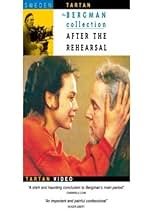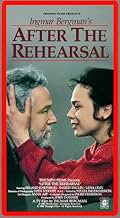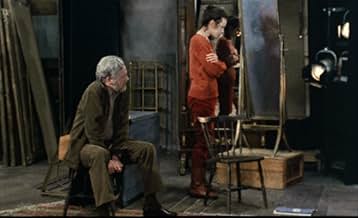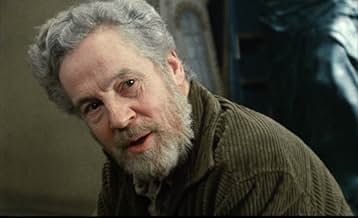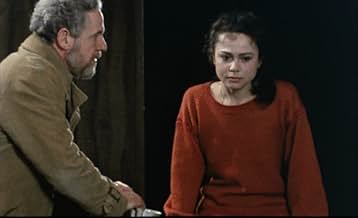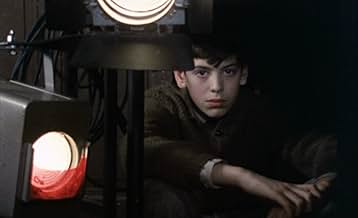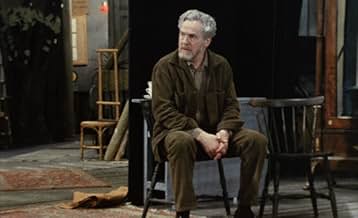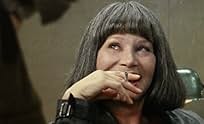IMDb RATING
7.1/10
3.2K
YOUR RATING
As an aging playwright interacts with the young lead in his play after everybody's gone home, he reminisces about her mother, whom he maintained a sexual relationship with before she died.As an aging playwright interacts with the young lead in his play after everybody's gone home, he reminisces about her mother, whom he maintained a sexual relationship with before she died.As an aging playwright interacts with the young lead in his play after everybody's gone home, he reminisces about her mother, whom he maintained a sexual relationship with before she died.
- Awards
- 2 nominations total
- Director
- Writer
- All cast & crew
- Production, box office & more at IMDbPro
Featured reviews
`After the Rehearsal', a film by Ingmar Bergman, is a reflective look at the art of theater and its practical implications in our lives. Bergman keeps to a relatively tight plot and cast - there are a total of three characters and one setting that endure over the course of 79 minutes. More than anything, `After the Rehearsal' is a study of our actions: their sincerity, what drives us to them, and how they are mirrored in the theater. It attempts to define human relationships and their high level of self-interest, at times appearing quite existentialistic. `After the Rehearsal' brazenly takes a look into social psychology, aging and theater. The story in `After the Rehearsal' focuses on playwright and director Henrik Vogler, his current star actress, Anna Eggerman, and her mother and Henrik's former lover - Rakel Eggerman. It all occurs after a rehearsal for Henrik's latest `Dream Play' when he is awoken by Anna Eggerman who is looking for her bracelet - a mere pretension to spend time with Henrik. While her desire for Henrik is obvious - he continuously refuses to yield to her flirtations. In the middle of the film, there is a long flashback where we witness Anna's alcoholic mother Rakel arguing with Henrik on the same backstage. Towards the end of the film, Henrik and Anna frenziedly create a romantic story of their future together, passionately delving deeper into their improvised story until Henrik stops it - he will never be able to carry out his desires in person at his age. Bergman's `After the Rehearsal' is not about a plotline, but rather, about unearthing the truth of our actions. During the course of the film, Henrik, while in conversation, will have a voice over which lays bare his thoughts and feelings towards who he is currently addressing. His dialogue is always an act - trying to make his words match his thoughts and thereby amassing a waste of energy. His words betray his thoughts and we learn how truly detached and distant he is from his surroundings. His words become no more than lines in a play; trying to express a thought in the most pleasing and successful way. Anna Eggerman is no better off than Henrik - she purposely lies to him so as to manipulate him and witness his various emotional responses. Rakel also epitomizes this separation from society by her professed desire for affection and company but consistent alcoholism and belligerent actions aimed towards Henrik - she is a mourner who has damned herself to wallow in her own pity. It would be accurate to dub `After the Rehearsal' as an existentialist work. Not only does it focus on man's separation from one another and the pointlessness of his actions, but it attempts to define why man acts as he does. In a self-revelation, Anna Eggerman supposes that she is acting only to please others - and that since childhood she has merely put on a stage face to get her own way. She is so absorbed by her subconscious actions that she does not realize she has become an actress offstage. Furthermore, it describes the plight of Henrik. In addition to the isolation Henrik suffers from the world, he is also plagued by his old age. As age has taken its toll, he no longer has the energy to have a relationship with Anna and can merely imagine it. His (and the film's) final words most exemplify his incapacity and detachment from the world, occurring when Anna tells him she can hear the church bells tolling as he says `I only wish that I was able to hear the bells'. `After the Rehearsal' is a meditative film that is not afraid to ask questions and propose answers. It eloquently expresses its views through a tightly-woven story that does not fail to hold its audiences attention. It dissects why man functions as he does through intense confrontations, philosophical ponderings and quiet revelations. Bergman unmasks the existential themes of distance and cold self-interest that lurk underneath our every word. `After the Rehearsal' is a complex and vital look at humanity that everyone should sit through at least once.
Here's a bit of an odd confession. I'm starting to like this Ingmar Bergman guy. Mind you, I've only seen two of his films (the other being Cries and Whispers) but he knows how to make a film, let me tell ya! After the Rehearsal is a great movie that makes you think, while marveling how clever the whole thing is. A theater director (played by Erland Josephson) is putting together a production called "The Dream Play". One of his actresses (Lena Olin) stays behind to talk to him about past experiences, his life and hers, and other existential topics. He does the same. A little while later an older actress comes on the scene, and essentially talks the same talk, only a little older but definitely not wiser. The interesting thing about this is, is that both women don't acknowledge the other.. So what's that about? Was this the same woman, only years later? Did these women exist at all, or are we indeed watching a "dream play" already? So many fascinating theories, I love it when a movie does that to me. The movie somewhat lags during the third act, but let me tell you, Bergman KNOWS how to end movies, like in Cries and Whispers and this one, it leaves some questions unanswered for us to figure out by ourselves, and Bergman seems to rejoice yanking us away from the story to go to the credits, which is great.
I want to see more! I will see more! Yay!
I want to see more! I will see more! Yay!
"After the Rehearsal was meant to be a pleasant little episode on my road toward death. ... (It) had a lot to do with my attitude and my relationship with the theater and the actors, with this dirty, dubious, fantastic, incredible, and cruel profession. That's all." -- Ingmar Bergman
Ingmar Bergman, age 66 and a couple years after his final feature film, Fanny and Alexander, was active in theater work and had a few TV movies left in him, of which this film is one. It takes place on a single set, a stage, has just three characters, and has the feeling of a simple play itself. It starts slowly but bear with it, it's only 73 minutes and finishes well.
Erland Josephson plays a theater director (without a doubt Bergman himself), who is musing in the empty theater after a rehearsal one day. His leading lady (Lena Olin) shows up on the pretext of looking for her bracelet; she's young enough to be his daughter, but has an interest in him. The two talk about their craft but also their personal lives, and as we come to understand that her mother worked with and loved him, she's conjured up in his imagination (Ingrid Thulin). It was a treat to see all three of these actors but maybe Thulin most of all, who at 58 has her character voice the sadness of aging, echoing the theater director in the present, even though she's still quite beautiful.
While it seemed a little bit vain of Bergman to have both the older and younger woman want him, er, the director sexually, the conversations build in momentum until with Olin he imagines the course their relationship would take if they gave in to their desire. It feels autobiographical and honest, helping to make up for a work that otherwise feels rather staid and erudite. While the film doesn't live up to its full potential, it's worth watching, especially if you're a Bergman fan.
Some quotes: "At my age, sometimes when you lean forward, your head suddenly finds itself in another reality. The dead are no longer dead. The living appear like ghosts. What was obvious a minute earlier becomes peculiar and hard to grasp."
"I'll tell you the pure and simple truth: I love actors. I love them as phenomena. I love their profession. I love their courage, or their contempt for death, whatever you want to call it. I understand their desire to escape, but also their dark, ruthless honesty."
"I hate turmoil, aggression, and outbursts of emotion. I administrate, distribute, and organize. I don't participate in the drama, I give it material form. I hate all things spontaneous, rash, and imprecise. I have no room for my own confusion except as a key to secrets of a script or as a stimulus for the creativity of actors."
"Nurture your childishness. It's a good filter against consciousness."
Ingmar Bergman, age 66 and a couple years after his final feature film, Fanny and Alexander, was active in theater work and had a few TV movies left in him, of which this film is one. It takes place on a single set, a stage, has just three characters, and has the feeling of a simple play itself. It starts slowly but bear with it, it's only 73 minutes and finishes well.
Erland Josephson plays a theater director (without a doubt Bergman himself), who is musing in the empty theater after a rehearsal one day. His leading lady (Lena Olin) shows up on the pretext of looking for her bracelet; she's young enough to be his daughter, but has an interest in him. The two talk about their craft but also their personal lives, and as we come to understand that her mother worked with and loved him, she's conjured up in his imagination (Ingrid Thulin). It was a treat to see all three of these actors but maybe Thulin most of all, who at 58 has her character voice the sadness of aging, echoing the theater director in the present, even though she's still quite beautiful.
While it seemed a little bit vain of Bergman to have both the older and younger woman want him, er, the director sexually, the conversations build in momentum until with Olin he imagines the course their relationship would take if they gave in to their desire. It feels autobiographical and honest, helping to make up for a work that otherwise feels rather staid and erudite. While the film doesn't live up to its full potential, it's worth watching, especially if you're a Bergman fan.
Some quotes: "At my age, sometimes when you lean forward, your head suddenly finds itself in another reality. The dead are no longer dead. The living appear like ghosts. What was obvious a minute earlier becomes peculiar and hard to grasp."
"I'll tell you the pure and simple truth: I love actors. I love them as phenomena. I love their profession. I love their courage, or their contempt for death, whatever you want to call it. I understand their desire to escape, but also their dark, ruthless honesty."
"I hate turmoil, aggression, and outbursts of emotion. I administrate, distribute, and organize. I don't participate in the drama, I give it material form. I hate all things spontaneous, rash, and imprecise. I have no room for my own confusion except as a key to secrets of a script or as a stimulus for the creativity of actors."
"Nurture your childishness. It's a good filter against consciousness."
This is a brilliant work of art - it manages to be both an outstanding piece of theatre captured on film and an equally engaging film about theatre. There is no plot in a conventional sense, and absolutely no action. Instead, Erland Josephson, utterly convincing in his role as an aging theatre director, quietly and with ruthless honesty interacts with both his current new star and an actress from his personal and professional past. During this interplay, the director on the screen (speaking for the director behind the camera?) explains his love for actors and the theatre, while simultaneously modeling and undermining the sense of alienation that he feels he needs to have in order to get his job done in this world that he loves. At the same time, his young star examines her reasons for acting, and the woman from his past presents yet another take on the function of theatricality.
The dialogue is, as always with Bergman, perfect; the film is saturated with ideas; and the simple stage where every moment of the film takes place works in two directions at once, reminding us that we are watching a performance even while it insists we are also seeing "real" people at work.
Bergman is always amazing in his ability to express, in films that are set in singular specific locations, deep emotions and concepts that are nonetheless universal - in this film he gives us a little bonus, an insight into the motives behind manufacture of representation itself.
The dialogue is, as always with Bergman, perfect; the film is saturated with ideas; and the simple stage where every moment of the film takes place works in two directions at once, reminding us that we are watching a performance even while it insists we are also seeing "real" people at work.
Bergman is always amazing in his ability to express, in films that are set in singular specific locations, deep emotions and concepts that are nonetheless universal - in this film he gives us a little bonus, an insight into the motives behind manufacture of representation itself.
Here's an interesting little movie with a cast of three, set entirely on a stage, and that jumps backwards and forwards in time.
Henrik is a theater director spending some time alone on the stage after a rehearsal of A Dream Play by August Strindberg. He wants to collect himself before he returns to his domicile to take a nap prior to that night's rehearsal. As he sits there, one of his actresses, Anna, arrives on stage with a thin story of looking for a bracelet. What follows is a long conversation between the two that swirls around topics as it operates as some kind of seduction, direction, and exploration of the other.
About a third of the way through, something happens that is quite jarring at first. Another woman shows up on stage. This is Rakel, Anna's mother who has been dead for ten years. Anna sits on the couch watching the scene without moving or speaking, and we soon deduce that Henrik is playing out a conversation he had had with Rakel eleven years before, just prior to her death.
Rakel was a great actress in her day. She played the same role Anna is playing to great acclaim, but she had Anna and quit acting. At the time of the conversation, she's living in a hospital and the small role she's playing (the mother) is almost an act of pity on the part of Henrik. He used to love her, but she spurned his affections before. However, in this conversation, she throws herself at him, and Henrik cannot stand it. He eventually makes an empty promise to follow her to her room, but we get the impression that there's going to be no encounter.
The conversation returns to Anna as Henrik takes up the exact same position he had been in when Rakel had walked on, implying that what we had seen was just a memory that had passed in a flash. In this final third of the film, souls are bared and dark revelations of Anna's recent past come out. There are protestations of love and hate. It's a swirl of emotions that's surprisingly effective.
The movie ends when the camera suddenly cuts to a new view we haven't seen before. The movie has almost entirely shot with cameras from the audience pit, but the final shot is to the stage from the side. We see a giant brick wall and the director and young actress small against it. The conversation even changes tenor becoming more professional in nature than emotional. Something's drastically changed.
Early in the movie, Henrik talks about how he's willing to do anything to work with actors (whom he loves) in order to help them reach their potential. He looks like he's playing in their field, but he's never really involved. So, at that final shot, those words came back to me, and I asked, "Was it all an act?" Were the high emotions and swings all about directing his actor?
It's an interesting exploration of the relationship between directors and actors, something obviously intimately familiar to Bergman. Watching the movie, it became obvious how Bergman could strike up so many affairs with so many of his actresses, and, at the same time, how they could all fall apart in the end. Still, the movie is a little insular to acting specifically which limits its broad appeal. It's a good little movie, a fascinating little footnote in Bergman's career.
Henrik is a theater director spending some time alone on the stage after a rehearsal of A Dream Play by August Strindberg. He wants to collect himself before he returns to his domicile to take a nap prior to that night's rehearsal. As he sits there, one of his actresses, Anna, arrives on stage with a thin story of looking for a bracelet. What follows is a long conversation between the two that swirls around topics as it operates as some kind of seduction, direction, and exploration of the other.
About a third of the way through, something happens that is quite jarring at first. Another woman shows up on stage. This is Rakel, Anna's mother who has been dead for ten years. Anna sits on the couch watching the scene without moving or speaking, and we soon deduce that Henrik is playing out a conversation he had had with Rakel eleven years before, just prior to her death.
Rakel was a great actress in her day. She played the same role Anna is playing to great acclaim, but she had Anna and quit acting. At the time of the conversation, she's living in a hospital and the small role she's playing (the mother) is almost an act of pity on the part of Henrik. He used to love her, but she spurned his affections before. However, in this conversation, she throws herself at him, and Henrik cannot stand it. He eventually makes an empty promise to follow her to her room, but we get the impression that there's going to be no encounter.
The conversation returns to Anna as Henrik takes up the exact same position he had been in when Rakel had walked on, implying that what we had seen was just a memory that had passed in a flash. In this final third of the film, souls are bared and dark revelations of Anna's recent past come out. There are protestations of love and hate. It's a swirl of emotions that's surprisingly effective.
The movie ends when the camera suddenly cuts to a new view we haven't seen before. The movie has almost entirely shot with cameras from the audience pit, but the final shot is to the stage from the side. We see a giant brick wall and the director and young actress small against it. The conversation even changes tenor becoming more professional in nature than emotional. Something's drastically changed.
Early in the movie, Henrik talks about how he's willing to do anything to work with actors (whom he loves) in order to help them reach their potential. He looks like he's playing in their field, but he's never really involved. So, at that final shot, those words came back to me, and I asked, "Was it all an act?" Were the high emotions and swings all about directing his actor?
It's an interesting exploration of the relationship between directors and actors, something obviously intimately familiar to Bergman. Watching the movie, it became obvious how Bergman could strike up so many affairs with so many of his actresses, and, at the same time, how they could all fall apart in the end. Still, the movie is a little insular to acting specifically which limits its broad appeal. It's a good little movie, a fascinating little footnote in Bergman's career.
Did you know
- TriviaIngmar Bergman was so impressed when he met Lena Olin for the first time that he wrote the part of Anna especially for her.
Details
- Release date
- Countries of origin
- Language
- Also known as
- After the Rehearsal
- Filming locations
- Production companies
- See more company credits at IMDbPro
Box office
- Gross worldwide
- $942
Contribute to this page
Suggest an edit or add missing content

